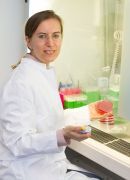Prof. Dr. Bettina Löffler
Bettina Löffler
Foto: UKJInstitut für Medizinische Mikrobiologie
Universtätsklinikum Jena
Am Klinikum 1
07747 Jena
Telefon: + 49 3641 9 393 504
bettina.loeffler@med.uni-jena.de
Funktionen
- Direktorin des Instituts für Medizinische Mikrobiologie, UKJ
- Vorstandsmitglied des Interdisziplinären Zentrums für Klinische Forschung (IZKF) des UKJ Jena
- Vorstandsmitglied des Center for Sepsis Control and Care (CSCC) mit Nachwuchsförderung
- Mitglied der Jena School for Microbial Communication (JSMC)
Forschungsgebiete
- Toxin-vermittelte Effekte bei bakteriellen Infektionen und viral-bakterielle Koinfektionen
- Persistenzstrategien von Pathogenen
- Infektionsmodelle und Testung von Therapiestrategien
- diagnostische Mikrobiologie
Publikationen (ausgewählte 5 aktuelle)
- B. Löffler, M. Hussain, M. Grundmeier, M. Bruck, D. Holzinger, G. Varga, J. Roth, B. C. Kahl, R. A. Proctor, G. Peters, Staphylococcus aureus panton-valentine leukocidin is a very potent cytotoxic factor for human neutrophils. PLoS Pathog 2010, 6:e1000715.
- L. Tuchscherr, E. Medina, M. Hussain, W. Völker, V. Heitman, S. Niemann, D. Holzinger, J. Roth, R. A. Proctor, K. Becker, G. Peters, B. Löffler, Staphylococcus aureus phenotype switching: an effective bacterial strategy to escape host immune response and establish a chronic infection. EMBO Mol Med 2011, 3:129-141.
- J. Wang, Y. Morita, B. Han, S. Niemann, B. Löffler, K. L. Rudolph, Per2 induction limits lymphoid-biased haematopoietic stem cells and lymphopoiesis in the context of DNA damage and ageing. Nat Cell Biol 2016, 18:480-490.
- B. C. Kahl, K. Becker, B. Löffler, Clinical Significance and Pathogenesis of Staphylococcal Small Colony Variants in Persistent Infections. Clin Microbiol Rev 2016, 29:401-427
- S. Deinhardt-Emmer, K. Rennert, E. Schicke, Z. Cseresnyes, M. Windolph, S. Nietzsche, R. Heller, F. Siwczak, K. F. Haupt, S. Carlstedt, M. Schacke, M. T. Figge, C. Ehrhardt, B. Löffler, A. S. Mosig, Co-infection with Staphylococcus aureus after primary influenza virus infection leads to damage of the endothelium in a human alveolus-on-a-chip model. Biofabrication 2020 12:025012.
